Exit Wahid, Enter Megawati, but Few Grounds for Optimism

Newly appointed President Megawati Sukarnoputri (L) and her newly sworn-in deputy Hamzah Haz wave for photgraphers as they leave Jakarta's parliament 26 July 2001. Haz who won the vote 340 to 237, said he hoped to work well with the country's new president Megawati Sukarnoputri who was installed Monday after parliament pushed out former president Abdurrahman Wahid. |
Abdurrahman Wahid finally lost his tenuous grip on Indonesia's presidency on July 23, when he was dismissed from office by a unanimous vote in Indonesia's parliament, shown live on national television. His dismissal came just hours after he had attempted to declare a state of emergency in the country and suspend parliament. Indonesia's Supreme Court had ruled the declaration illegal and parliament had continued deliberations into allegations of corruption and incompetence against him.
Immediately after Wahid's dismissal, opposition leader Megawati Sukarnoputri, daughter of former Indonesian leader Ahmed Sukarno, and originally vice-president when Wahid became president in 1999, was elected president in his place. She immediately set about constructing a cabinet, but had to operate from her vice-presidential office because Wahid refused to vacate the presidential palace, insisting against all political realities that he was still the legitimate president. As Crescent went to press, he was expected to leave for the US for 'medical treatment', as a face-saving way out of the impasse.
Megawati's succession was all but assured, as Wahid had long since lost the confidence of all Indonesia's political players. However, after his fall eventually came about, major political questions surrounded the election of a vice-president, with Hamzah Haz, leader of the United Development Party (PPP) and a senior figure in the Muslim Axis block, a leading candidate. Haz is a close ally of parliamentary speaker Amien Rais, who led the campaign to depose Wahid and is widely seen as a president in waiting.
In 1999, the election of Abdurrahman Wahid to the presidency of the most populous Muslim country in the world had been greeted with joy by many Indonesians and by ill-informed Muslims around the world. A former leader of Nahdatul Ulama, he had the public profile of an Islamic leader, although better-informed Muslims were sceptical, regarding him as an opportunist and a sham: he was known for his support for Israel and for a fondness for nightclubs, dancing and western music. As leader of the small National Development party (PKB), which won only 10 percent of seats in the 1999 elections, he was not initially regarded as a serious candidate for the presidency, winning only by default when Megawati appeared to back away from the post.
Among his early radical ideas was support for a referendum in Aceh, similar to that in East Timor earlier in the year. That proposal was exposed when he boasted in Beijing of his willingness to use repression in Aceh if necessary, a boast that has repeatedly been proven. The idea that he would prove a wise, conciliatory president, transcending the bickering between political factions, also proved false, and his removal from office was the culmination of a long period in which he was increasingly discredited.
After almost two years with a lame-duck leader, Indonesia may be about to get more of the same. Megawati is popular, but has shown few of the abilities required for high office, although she leads the largest party in Parliament, the Indonesian Democratic Party of Struggle (PDIP), which won 35 percent of the vote and 163 seats in Parliament, and was Wahid's vice-president.
She came to politics late in life, riding on the popularity of her late father, and is regarded as having limited intellectual ability (she twice failed to complete college courses), a short attention-span and an inability to read briefing papers or grasp details. Wahid gave her major responsibilities as vice-president, and there was widespread disappointment with her performance in addressing them, even as her supporters attacked Wahid for not giving her more power. These failures were largely overshadowed by Wahid's own failures.
Personal shortcomings aside, she will also face considerable political problems. The PDIP is now in danger of splitting between its non-Muslim and Muslim members, as many Christians and Chinese, traditional supporters of the secular PDIP, feel that the party has moved too far to accommodate the sensibilities of the country's Muslim majority.
At the same time Amien Rais, the country's most charismatic Islamist and the speaker of Parliament, is waiting in the wings. As leader of the Muslim Axis, an alliance of Muslim political parties controlling about 25 percent of Parliament, few doubt that his ambition is to become president himself. In 1999 he was disappointed that his own party, the National Mandate Party (PAN), won only 7 percent of the vote after he had predicted 25 percent support, and his support instead secured the presidency for Wahid. The question now is how long he is willing to wait to take over from Megawati. The next elections are due in 2004; it is less than clear that Megawati will last that long.
Meanwhile, of course, little is likely to change for the suffering people of Indonesia, be they victims of the military in Aceh, of anti-Muslim pogroms in other areas, or of the country's appalling economic and social problems all over the country.
_____________________________________
Crescent International is a newsmagazine of the global Islamic movement.

















